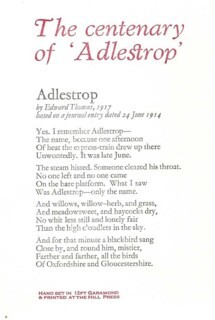Goneness is everywhere
Glen Newey remembers Adlestrop
After years working as a subeditor on the Grauniad – where, as the joke went, his job was to put in the typos – my brother Adam now bakes sourdough loaves for a living in his flat in NewCross Gate. He delivers the bread to the residents of Telegraph Hill in the pannier of a cream-coloured converted 125cc Taiwanese scooter. He also owns a small hand-operated lever-press made by Adana of Twickenham, and uses it to print poems that he encloses with each loaf. A spindled roller passes over a revolving disc painted with ink and passes it onto the set type, which is then clamped against the platen holding the paper as the lever is depressed. Typesetting is time-consuming – setting a poem (his preferred font is Garamond 12-point) can take several hours – and the composited formes use up most of his type, so he keeps a poem, once typeset, for a month at a time.
This month’s poem is ‘Adlestrop’, rendered here with an s-t ligature in italic (that's in Verdana Verona 36-point). It’s Edward Thomas’s best-known poem, but not his best. Some lines verge on the poetastical (‘no whit less still and lonely fair’). But it endures as a token of ruralism and loss, likeAlain-Fournier’s Le Grand Meaulnes, written around the same time. Goneness is, one might say, everywhere. Railway life in Adlestrop, an ancient village on the Cotswold Ridgeway – it figures in the Evesham Rolls for the eighth century, and the village is named as ‘Tedestrop’ in Domesday –ended after Beeching. The wooden station, designed by Brunel, was obliterated after passenger services ended in 1966. Today a bus stop incorporates the old railway sign.
According to Thomas’s field notebooks, the service from London to Worcester ran on 24 June 1914, and pulled up at Adlestrop at 12.45 p.m.:
Then we stopped at Adlestrop, thro the willows cd be heard a chain of blackbirds songs at 12.45 & one thrush & no man seen, only a hiss of engine letting off steam.
Stopping outside Campden by banks of long grass willow herb & meadowsweet, extraordinary silence between the two periods of travel.
No hint there of the train’s halting ‘unwontedly’, and indeed the GWR timetable for Wednesday, 24June 1914 has Adlestrop as a scheduled stop for 12.48 p.m. But the idea of impromptu hiatus, a time out of time, seems basic to the poem’s emotional discharge, particularly to its arc from the less than humdrum to the transfigurative, as the stressed-syllable rhymes of the first three stanzas give way to dactyls at the last.
Thomas didn’t write the poem immediately; he began it early in 1915. By then, the England that had not quite ever been had ceased to exist. Four days after Thomas paused at Adlestrop (he was goingto visit his friend Robert Frost in Dymock), the Archduke Franz Ferdinand and Archduchess Sophie met their end in Sarajevo. The assassination was a fluke: their motorcade had been diverted after a bomb was thrown at the royals earlier that morning; at first unaware of the route change, their driver hit reverse when he found out about it, causing the gears to lock. When the car made its unscheduled stop in front of Gavrilo Princip, who happened to have decamped there after the failed bomb-lob by one of his co-conspirators, he took his chance.
Because he was married, Thomas wouldn’t have been liable to conscription when it was introduced in 1916, but – as the story goes, piqued into decision by Frost’s ‘The Road Not Taken’ – he enlisted anyway in the Artists Rifles, now a unit of the Special Air Service. He was commissioned Second Lieutenant in the Royal Garrison Artillery in November 1916. Five months later he was killed by a shell blast at the battle of Arras; 'Adlestrop' was published 17 days later in the New Statesman. He’s buried at Agny military cemetery in France. Alain-Fournier only lasted a month before being killed in the Meuse in September 1914. His body was identified in 1991, and reburied at Saint-Rémy-la-Calonne.

Comments
DOCTOR BEECHING
Doctor Beeching
took a look
at the whole lot,
from Wem to Adlestrop.
"Got addled," he said,
"looking for what to chop,
then everyone anyway
got in a total strop.
"Have you ever taken
the M1 - it is very heaven -
the M4 - door to ditto -
M5, glad to be alive.
"One should never
travel faster than at
walking pace else
you'll miss the lot."
And with that, hayfever
got to him, he sneezed,
OXFORDSHIRE!
GLOUCESTERSHIRE!